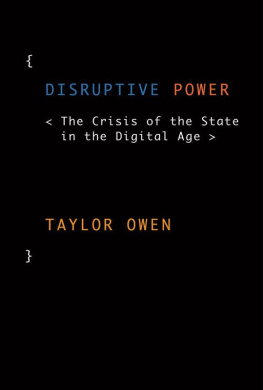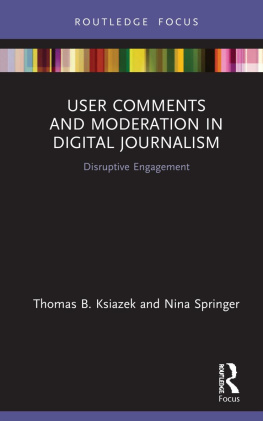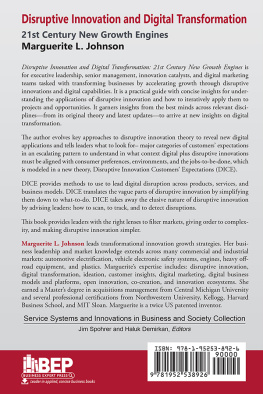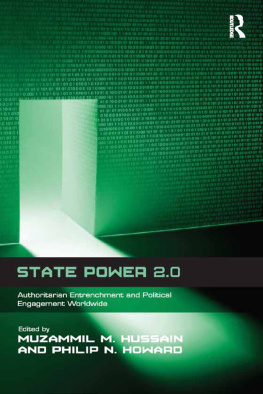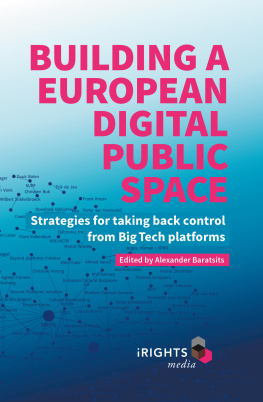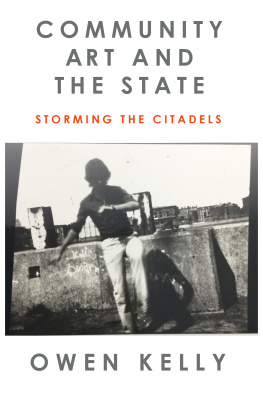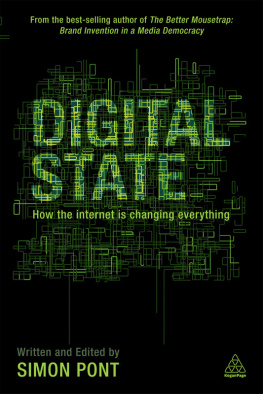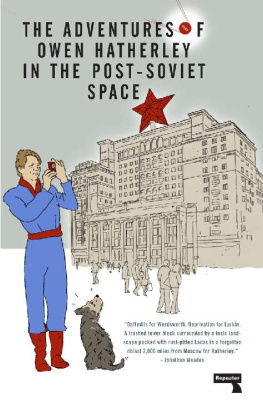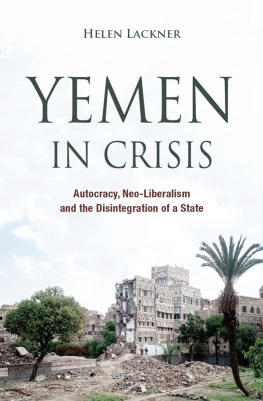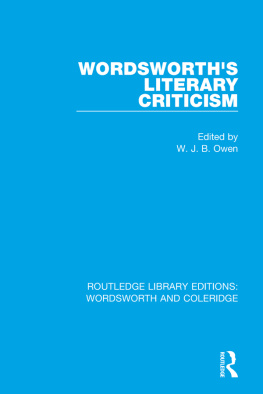Taylor Owen - Disruptive Power: The Crisis of the State in the Digital Age
Here you can read online Taylor Owen - Disruptive Power: The Crisis of the State in the Digital Age full text of the book (entire story) in english for free. Download pdf and epub, get meaning, cover and reviews about this ebook. year: 2015, publisher: Oxford University Press, genre: Politics. Description of the work, (preface) as well as reviews are available. Best literature library LitArk.com created for fans of good reading and offers a wide selection of genres:
Romance novel
Science fiction
Adventure
Detective
Science
History
Home and family
Prose
Art
Politics
Computer
Non-fiction
Religion
Business
Children
Humor
Choose a favorite category and find really read worthwhile books. Enjoy immersion in the world of imagination, feel the emotions of the characters or learn something new for yourself, make an fascinating discovery.
- Book:Disruptive Power: The Crisis of the State in the Digital Age
- Author:
- Publisher:Oxford University Press
- Genre:
- Year:2015
- Rating:5 / 5
- Favourites:Add to favourites
- Your mark:
- 100
- 1
- 2
- 3
- 4
- 5
Disruptive Power: The Crisis of the State in the Digital Age: summary, description and annotation
We offer to read an annotation, description, summary or preface (depends on what the author of the book "Disruptive Power: The Crisis of the State in the Digital Age" wrote himself). If you haven't found the necessary information about the book — write in the comments, we will try to find it.
Taylor Owen: author's other books
Who wrote Disruptive Power: The Crisis of the State in the Digital Age? Find out the surname, the name of the author of the book and a list of all author's works by series.
Disruptive Power: The Crisis of the State in the Digital Age — read online for free the complete book (whole text) full work
Below is the text of the book, divided by pages. System saving the place of the last page read, allows you to conveniently read the book "Disruptive Power: The Crisis of the State in the Digital Age" online for free, without having to search again every time where you left off. Put a bookmark, and you can go to the page where you finished reading at any time.
Font size:
Interval:
Bookmark:
DISRUPTIVE POWER
OXFORD STUDIES IN DIGITAL POLITICS
Series Editor: Andrew Chadwick, Royal Holloway, University of London
Expect Us: Online Communities and Political Mobilization
Jessica L. Beyer
The Hybrid Media System: Politics and Power
Andrew Chadwick
Tweeting to Power: The Social Media Revolution in American Politics
Jason Gainous and Kevin M. Wagner
The Digital Origins of Dictatorship and Democracy: Information Technology and Political Islam
Philip N. Howard
Democracys Fourth Wave? Digital Media and the Arab Spring
Philip N. Howard and Muzammil M. Hussain
The MoveOn Effect: The Unexpected Transformation of American Political Advocacy
David Karpf
Taking Our Country Back: The Crafting of Networked Politics from Howard Dean to Barack Obama
Daniel Kreiss
Bits and Atoms: Information and Communication Technology in Areas of Limited Statehood
Steven Livingston and Gregor Walter-Drop
Digital Cities: The Internet and the Geography of Opportunity
Karen Mossberger, Caroline J. Tolbert, and William W. Franko
Revolution Stalled: The Political Limits of the Internet in the Post-Soviet Sphere
Sarah Oates
Affective Publics: Sentiment, Technology, and Politics
Zizi Papacharissi
Presidential Campaigning in the Internet Age
Jennifer Stromer-Galley
News on the Internet: Information and Citizenship in the 21st Century
David Tewksbury and Jason Rittenberg
DISRUPTIVE POWER
T HE C RISIS OF THE S TATE IN THE D IGITAL A GE
TAYLOR OWEN


Oxford University Press is a department of the University of Oxford. It furthers the Universitys objective of excellence in research, scholarship, and education by publishing worldwide.
Oxford New York
Auckland Cape Town Dar es Salaam Hong Kong Karachi Kuala Lumpur Madrid Melbourne Mexico City Nairobi New Delhi Shanghai Taipei Toronto
With offices in
Argentina Austria Brazil Chile Czech Republic France Greece Guatemala Hungary Italy Japan Poland Portugal Singapore South Korea Switzerland Thailand Turkey Ukraine Vietnam
Oxford is a registered trade mark of Oxford University Press in the UK and certain other countries.
Published in the United States of America by
Oxford University Press
198 Madison Avenue, New York, NY 10016
Taylor Owen 2015
All rights reserved. No part of this publication may be reproduced, stored in a retrieval system, or transmitted, in any form or by any means, without the prior permission in writing of Oxford University Press, or as expressly permitted by law, by license, or under terms agreed with the appropriate reproduction rights organization. Inquiries concerning reproduction outside the scope of the above should be sent to the Rights Department, Oxford University Press, at the address above.
You must not circulate this work in any other form and you must impose this same condition on any acquirer.
Cataloging-in-Publication data is on file at the Library of Congress
9780199363889
1 3 5 7 9 8 6 4 2
Printed in the United States of America on acid-free paper
To: R & W
CONTENTS
This book represents the culmination of three meandering years exploring the intersection of digital technology and international affairs and is ultimately the product of many peoples work. It began as a lecture and working paper for the Trudeau Foundation in the spring of 2012, and I am appreciative of PG Forest giving me the chance to come back to the Foundation and try out some new ideas on the smartest (and most critical) crowd in Canada. At the time, the ideas presented were nascent, and represented my initial explorations of what I increasingly saw as the profound ways technology was reshaping the international system.
This essay became a larger research project funded by a Social Sciences and Humanities Research Council grant called International Relations in the Digital Age, a partnership between the Canadian International Council and UBC. My friend and colleague Anouk Dey was critical as an RA on both of these initial stages. And my co-PI on the SSHRC research project, partner at the CIC and Open-Canada and close friend Jennifer Jeffs built the project and team with me. We had a great group of UBC journalism students helping out with a wide range of research, including Sadiya Ansari, Lindsay Sample, Kate Adach, Alexis Beckett, and Alexandra Gibb.
For the year I spent focusing on researching and writing the book, I had the amazing good fortune of having two wonderful RAs, Tanzeel Hakak and Cherise Seucharan. Both are wise beyond their years, and handled my ridiculous schedule and wandering (they would say vague) ideas with grace and persistence. Many of the ideas in this book are theirs as much as mine.
While writing this book I was also working at the Tow Center for Digital Journalism at Columbia with the extraordinary and tolerant Emily Bell. The incredible opportunities that working with Emily on building the Tow Center afforded me, as well as the time she allowed me to binge write among the cramming undergrads in the Bodleian, made this book possible.
As I have now learned, bringing a book into the world is a process. Three people made this one happen. First, Ethan Bassoff at Lippincott Massie McQuilkin took a chance on me, and got this book into the hands of New York publishers. Second, Angela Chnapko at Oxford University Press was supportive, encouraging, and incredibly helpful at every stage of the editing and publishing process. Finally, Blake Eskin agreed to dive in to the project as an utterly ruthless editor, and gave me the most educational writing experience I have ever had.
Finally, and by far most importantly, I owe everything to my amazing parents and to my best friend, confidant, fiercest critic, partner and wife Ariel, and to our little man Walter.
DISRUPTIVE POWER
Information is power. But like all power, there are those who want to keep it for themselves. Aaron SwartzIn January 2012, the Federal Bureau of Investigation (FBI), Scotland Yard, and intelligence agencies in Italy, France, the Netherlands, Denmark, and Sweden created a task force to counter Anonymous. These countries saw the collective of activist hackers and its numerous offshoots as a national security threat.
Anonymouswhich is best defined as an Internet gathering with a loose and decentralized command structure that operates on ideas rather than directivesname of Anonymous, ebbing and flowing in both scale and frequency. The group has inserted itself into political conflicts in the United States and around the globe.
In November 2011, at an Occupy rally against budget cuts and increased tuition at the University of California, San Diego, a riot police officer was filmed pepper-spraying a peaceful protestor. When video of the incident went viral on YouTube, Anonymous responded by leaking the police officers name, address, phone number, and email address. He received over 17,000 threatening emails, 10,000 text messages, and hundreds of letters. The group did the same to Arizona Department of Public Safety officials in response to the passage of Arizona Bill 1070, an anti-immigration bill widely seen as racist. This attack was part of the bigger operation called Anti-Sec in which Anonymous attacked many Western governments for reasons ranging from Internet censorship to racial profiling.
During the Arab Spring, Anonymous worked in support of anti-government protestors in Tunisia, Egypt, and Libya, hacking into government websites, shutting them down with distributed denial-of service (DDoS) attacks, and releasing names, email addresses, and passwords of government officials. In December of 2011, in the name of revealing corporate and government corruption, Anonymous hacked into the US intelligence consultancy Stratfor, obtaining, among other data, 2.7 million corporate emails detailing often sensitive conversations involving current and former government officials and thousands of off-the-record sources.
Next pageFont size:
Interval:
Bookmark:
Similar books «Disruptive Power: The Crisis of the State in the Digital Age»
Look at similar books to Disruptive Power: The Crisis of the State in the Digital Age. We have selected literature similar in name and meaning in the hope of providing readers with more options to find new, interesting, not yet read works.
Discussion, reviews of the book Disruptive Power: The Crisis of the State in the Digital Age and just readers' own opinions. Leave your comments, write what you think about the work, its meaning or the main characters. Specify what exactly you liked and what you didn't like, and why you think so.

